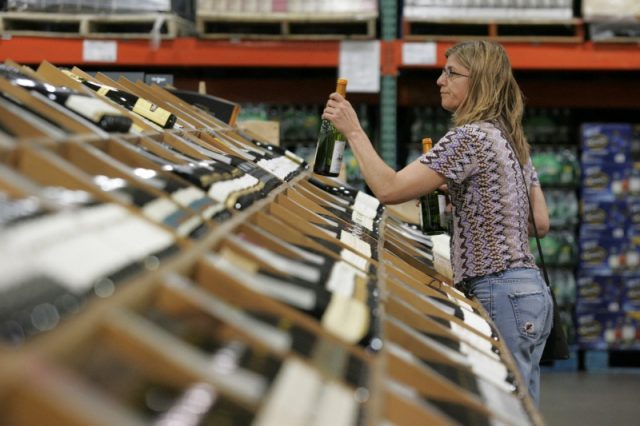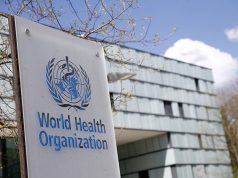
- Surgeon General calls for reassessment of alcohol consumption guidelines
- Alcohol consumption linked to seven types of cancer, report states
- European and U.S.-listed drinks makers’ shares fall
- Unclear when or if Surgeon General’s suggestions will be adopted
WASHINGTON/LONDON — Alcoholic drinks should carry a warning about cancer risks on their label, the U.S. Surgeon General said on Friday in a move that could signal a shift toward more aggressive tobacco-style regulation for the sector if adopted.
U.S. Surgeon General Vivek Murthy said alcohol consumption increases the risk of at least seven types of cancer, including breast, colon and liver cancer, but most U.S. consumers remain unaware of this.
Murthy also called for the guidelines on alcohol consumption limits to be reassessed so that people can weigh the cancer risk when deciding whether or how much to drink. U.S. dietary guidelines currently recommend two or fewer drinks per day for men and one drink or less per day for women.
“Alcohol consumption is the third leading preventable cause of cancer in the United States, after tobacco and obesity,” Murthy’s office said in a statement accompanying the new report, adding the type of alcohol consumed does not matter.
His advisory sent shares in alcohol companies including Diageo DGE.L, Pernod Ricard PERP.PA, Anheuser-Busch InBev ABI.BR and Heineken HEIN.AS down, in some cases over 3%.
The Distilled Spirits Council of the United States (DISCUS), which represents top spirits makers, pointed to a new report by the National Academies of Sciences, Engineering and Medicine showing that moderate alcohol consumption is associated with lower rates of death from any causes, as well as higher risk of breast cancer.
“The current health warning on alcohol products has long informed consumers about the potential risks of the consumption of alcohol,” the group’s vice president for science, Amanda Burger, said in a statement, adding that no one should drink for health benefits.
The U.S. Beer Institute promotes responsible consumption of alcohol, a spokesperson said.
It is unclear when or if the Surgeon General’s suggestions will be adopted. U.S. President Joe Biden’s administration is ending. Murthy could be succeeded by Janette Nesheiwat, a director of a New York chain of urgent care clinics and president-elect Donald Trump’s pick for the role.
Trump, whose brother died from alcoholism and who does not drink himself, has long warned about the risks of alcohol. Robert F. Kennedy Jr., Trump’s nominee for Secretary of Health and Human Services, has been open about his past struggles with heroin and alcohol, and says he attends Alcoholics Anonymous meetings.
The decision to update labels will ultimately be made by Congress.
Small print
Murthy’s advisory harks back to early U.S. Surgeon General action on tobacco, starting with a 1964 report that concluded smoking could cause cancer. The report kicked off decades of increasingly strict regulations, starting with U.S. laws on warning labels one year later and still ongoing today.
Alcoholic drinks in the U.S. already carry warnings on packaging, including that drinking alcohol while pregnant can cause birth defects and impair judgment when operating machinery. These appear in small print on the back of the packaging. This label has not changed since its inception in 1988.
Murthy’s recommendations call for an update to existing labels, rather than new cigarette-style warnings that are displayed prominently on every packet.
Analysts, however, say cigarette warning labels did little to curb smoking and ingrained habits are hard to change.
“Warning labels won’t be an immediate deathblow to alcohol makers, but it will compound the long-term threats to the industry,” said Blake Droesch, analyst with eMarketer.
In the U.S., among the largest markets for many western producers, alcohol sales have been falling following a post-pandemic boom. Revenues are further threatened by looming tariffs. Longer-term, companies face competition from alternatives like cannabis and the threat of lower volumes as some consumers, especially younger ones, drink less than previous generations in some markets.
Beer makers, however, have enjoyed benefits from a shift towards healthier lifestyles, with low- or no-alcohol products enjoying rapid growth. Heineken’s 0.0 version, for example, grew double digits in 16 markets last year.
‘Save lives’
Public health bodies like the World Health Organization are also increasingly turning their attention toward alcohol after making progress on stronger tobacco controls.
The WHO says there is no safe level of drinking and that even a small amount of alcohol can harm health – a position that has prompted tense debate around the impact of moderate drinking and its role in society.
The Mayo Clinic says the health risk is low for moderate intake and rises with the amount consumed. The Surgeon General report says higher consumption raises risks and imbibing two drinks a day would result in about five more women out of 100 developing cancer and three more men out of 100.
Current U.S. dietary guidelines run until 2025, and companies including Diageo and Heineken have lobbied officials ahead of the change, lobbying records show, amid concerns the U.S. could adopt the WHO’s language around safe consumption.
Other countries’ guidelines already include such language, while nations like Ireland have already moved to introduce warning labels.
Some scientists accused the industry of misleading people about the risks of developing cancer from drinking in a 2017 study. DISCUS said the researchers had anti-alcohol biases and their study was selective.
The Surgeon General’s advisory said alcohol is responsible for 100,000 U.S. cancer cases and 20,000 cancer deaths each year, and more than the 13,500 alcohol-associated traffic crash deaths.
— Reporting by Brendan O’Brien and Susan Heavey in Washington, Bhanvi Satija in Bengaluru, and Emma Rumney in London; Additional reporting by Savyata Mishra and Anuja Bharat Mistry in Bengaluru, Arianna Mclymore and Nathan Layne in New York; Editing by William Maclean, Gareth Jones, Krishna Chandra Eluri, Peter Henderson, Nick Zieminski and Bill Berkrot









